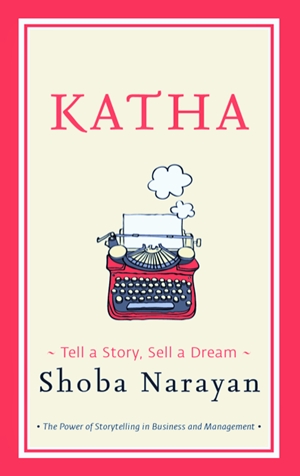A Katha for corporations from a master story teller
17 Oct 2015
 Shoba Narayan is an award-winning author and columnist. She is a regular for Mint and has previously written for The New York Times, The Wall Street Journal, CondeNast Traveler, Time, The National Abu Dhabi and Knowledge@Wharton, among others. She has also authored two memoirs: Return to India and Monsoon Diary.
Shoba Narayan is an award-winning author and columnist. She is a regular for Mint and has previously written for The New York Times, The Wall Street Journal, CondeNast Traveler, Time, The National Abu Dhabi and Knowledge@Wharton, among others. She has also authored two memoirs: Return to India and Monsoon Diary.
Narayan conducts regular storytelling workshops for corporate leaders. In this interview with Swetha Amit, she talks about how penning down Katha her new novel, has impacted her as a person, the attributes of being a good story teller and how story telling is different from marketing.
Katha is a book that talks about the power of storytelling in business and management. How did the idea to write this book come about?
About two years ago, my publisher, Rupa Publications, approached me and said they were starting a business imprint and requested me to write a book for it.
My editor, Dibakar Ghosh, my previous editor Kausalya Saptarishi and I brainstormed as to what I could write, considering the fact that I had no prior background in business. After discussing several ideas, it boiled down to to what I do in my job as a columnist. That's how we came up with the concept of storytelling and in a span of time Katha was born.
Stories are often known to change several lives. Being a journalist, where selling a story becomes vital, how has writing this book impacted you as a person?
Writing this book has impacted me in a lot of ways. Firstly, I learnt that the two worlds of art and business are not as distinct or disconnected as people perceive them to be. Renowned business leaders incorporate the aspects of storytelling and emotion which we traditionally associate only with art.
However the biggest learning which I derived from authoring Katha is to avoid dividing the world into separate segments of science, humanities, arts, and business and instead find ways to connect these various aspects of human exitence. Also from someone with an arts and humanities background, writing this book gave me an insight into how the business world functions and this proved to be a valuable lesson for me.
Your book emphasises on how the concept of storytelling is essential in order to sell a business or a dream, something which requires persuasive and convincing abilities. How would you differentiate this concept from what is termed 'marketing'?
Now that's a good question. I would say story telling is much more subtle than marketing.
Story telling emphasises more about connections while marketing talks about a product alone. In storytelling, the humane aspect exists as you convince people to come along in the journey unlike marketing, which is just a mere transaction. Story telling is more about relationship building and definitely more long term than marketing.
You have mentioned how story telling isn't as easy as it appears to be. What are the attributes one needs in order to become a good story teller?
Firstly one has to find a story, read the audience and then discover as to which story would resonate with them. Therefore a relevant story needs to be chosen keeping the audience in mind followed by a good narration.
One of the key skills required is that of being a good listener and to understand what will resonate well with the person on the other side. The other skill required is that of introspection, which doesn't come that easily to many people. Introspection involves looking back at one's life and coming up with something interesting to narrate to the concerned audience.
Therefore, in order to make story telling a compelling process, one needs to acquire the skills of introspection, narration, connection and listening. These are attributes which are not easy to cultivate and one needs to put in a great deal of effort for that.
Corporate story telling is seen as a powerful tool where a bit of exaggeration is inevitable to sell a story. How does one maintain that fine balance between authenticity and not going overboard while narrating it?
One needs to understand that any knowledgeable customer will be able to identify when some one is actually exaggerating or going overboard. Once they do that, then story tellers lose credibility entirely. So one needs to always assume that the audience they are dealing with is not dumb. Keeping this in mind is a great way to hold back from going overboard and maintaining that balance.
 | |
| Publisher:Rupa publications Genre:Non Fiction/Business |
An interesting example of one of the characters, Mallika, in your book showcases how stories tend to connect people; where her initiative of revealing her journey as a CEO to her top performers made them feel like a part of the family. However, what happens when stories drive people apart and such initiatives backfire? How should one deal with this?
Well just as a PowerPoint presentation or a compilation of data can fail, storytelling too has the power to fail. So if the story telling aspect fails, then one should resort to trying other things from the tool kit.
One can opt for tactics like logic, compensation, negotiation PowerPoint, data analysis, etc. I think that the approach should be to think of storytelling as just one more thing in the tool kit, which is the point I have made in my book. This is with respect to a corporate world scenario.
In a personal or social world, where one faces situations like misunderstanding with friends or colleagues, if story telling doesn't work, one needs to give it time. Once a certain amount of time lapses, one could explain the situation with a colleague / friend in a relaxed atmosphere by taking them out to lunch or coffee. I would say humour also helps in easing tense situations. Unfortunately, it doesn't seem to work very well as it's a difficult tool to adopt.
Speeches by corporate leaders often contain anecdotes, which is believed to make an impact on the audience. So, how do we retain the attention span of the audience before giving a speech to create that positive impact, relatability quotient and avoid spells of boredom?
I think in such a situation, leaders should avoid long and rambling stories, which could lead to boredom spells. In a corporate world especially, storytelling could be as simple as a one-liner in the form of a proverb.
For instance if there is a project deadline and things have not moved at the pace they should have; a way to explain this to your boss in an effective manner without rambling could be a proverb which is apt to the situation. Proverbs are available in different languages and one can use them appropriately depending on the type of audience. These one liners will not only capture the attention of the audience but also elevate the relatability quotient, humour and attention span.
Lastly what are your plans? Any more books?
Yes, of course. In fact I am working on two - three books at the moment. They are all in the non-fiction genre. However at some point, I would like to write fiction but I am not there yet.
(See: Excerpt from Katha: Stories build teams and create a shared sense of purpose)


















